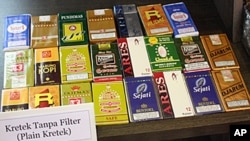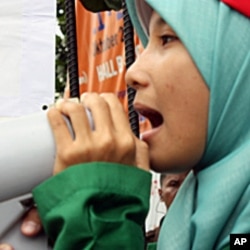The Indonesian Health Ministry wants to ban all forms of cigarette advertising, stripping roadside billboards, magazines and television channels of ads and huge sums of money. The tobacco industry opposes the move, arguing that its products are legal and that they have the right to market to adults.
High school students rally outside the recent World Tobacco Asia 2010 Expo, telling exhibiters to stop promoting tobacco in their country. Tobacco companies should be ashamed, they shout, to target Indonesia's youth.
The expo's organizer is the trade association World Tobacco, based in the United States. World Tobacco attracted exhibiters to the expo by describing Indonesia as "a place with a government that is positive and favorable toward the tobacco industry".
But that may be changing.
In draft regulations, to be implemented next year, the Health Ministry proposes raising the tobacco tax by 5 percent, cracking down on smoking in public buildings, and placing graphic health warnings on cigarette packs.
Indonesia is one of the few countries in the world yet to ratify the World Health Organization's framework convention on tobacco control. The convention requires a number of efforts to curb tobacco consumption, for example, through raising prices, banning sales to minors and reducing advertising and promotional efforts.
Sixty-three million Indonesian adults smoke and a 2009 Health Ministry survey indicates the number of young smokers is growing.
It is not unusual for children here to smoke, and 25 percent of Indonesians aged 13 to 16 are regular smokers.
Cigarette advertising is allowed just about anywhere.
The National Commission on Tobacco Control welcomes the proposed ban. Mia Hanafiah is the commission's executive director.
She says the commission supports the Health Ministry's move to ban all tobacco advertising. Just putting restrictions on advertising is not effective, and young Indonesians are the ones who suffer.
Tobacco companies, however, are unhappy with the Health Ministry's plan to ban all tobacco advertising.
Agung Suryanto is the vice secretary general of the Indonesian Tobacco Alliance.
He says the alliance agrees with banning all advertising and activities to promote cigarettes to youths, as the 2009 health law stipulates. But because tobacco products are legal, Agung says, companies should be able to market their products to adults, just like any other legal product.
But Hanafiah at the National Commission on Tobacco Control says that the government cannot just take cigarette companies' word that they will not market to children.
She says tobacco companies might claim they are targeting adults, but it is obvious they are targeting youth. They use famous rock musicians and show images of athletic men to promote their products. They do not need to reel in adults - they are already addicted. They are looking for new young smokers.
As in many countries, tobacco companies in Indonesia promote their products by sponsoring events such as sports matches and pop music concerts. But critics say those events often attract young people.
The proposed ban on advertising must first be approved by relevant ministries, and then must be signed by the president. Health Ministry officials are optimistic the regulation will be approved by the end of the year, ready for implementation in 2011.













